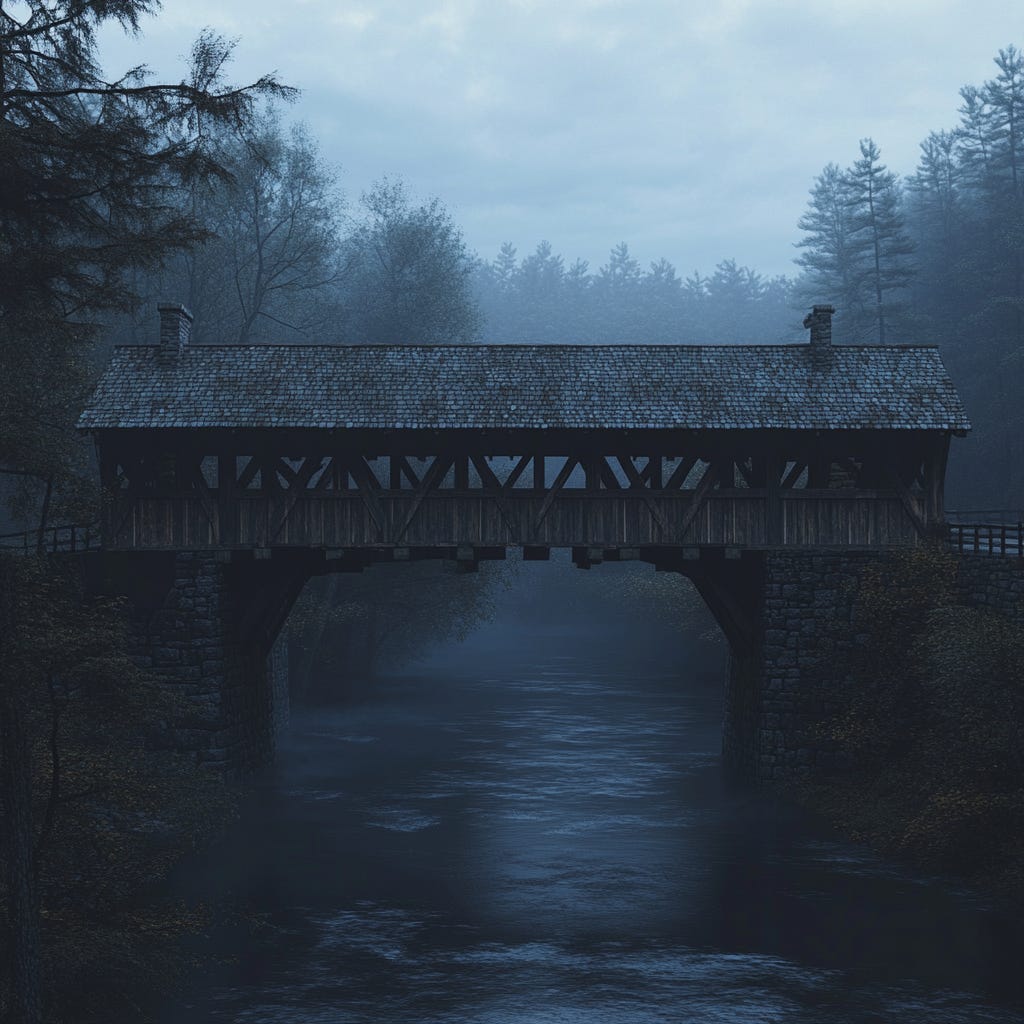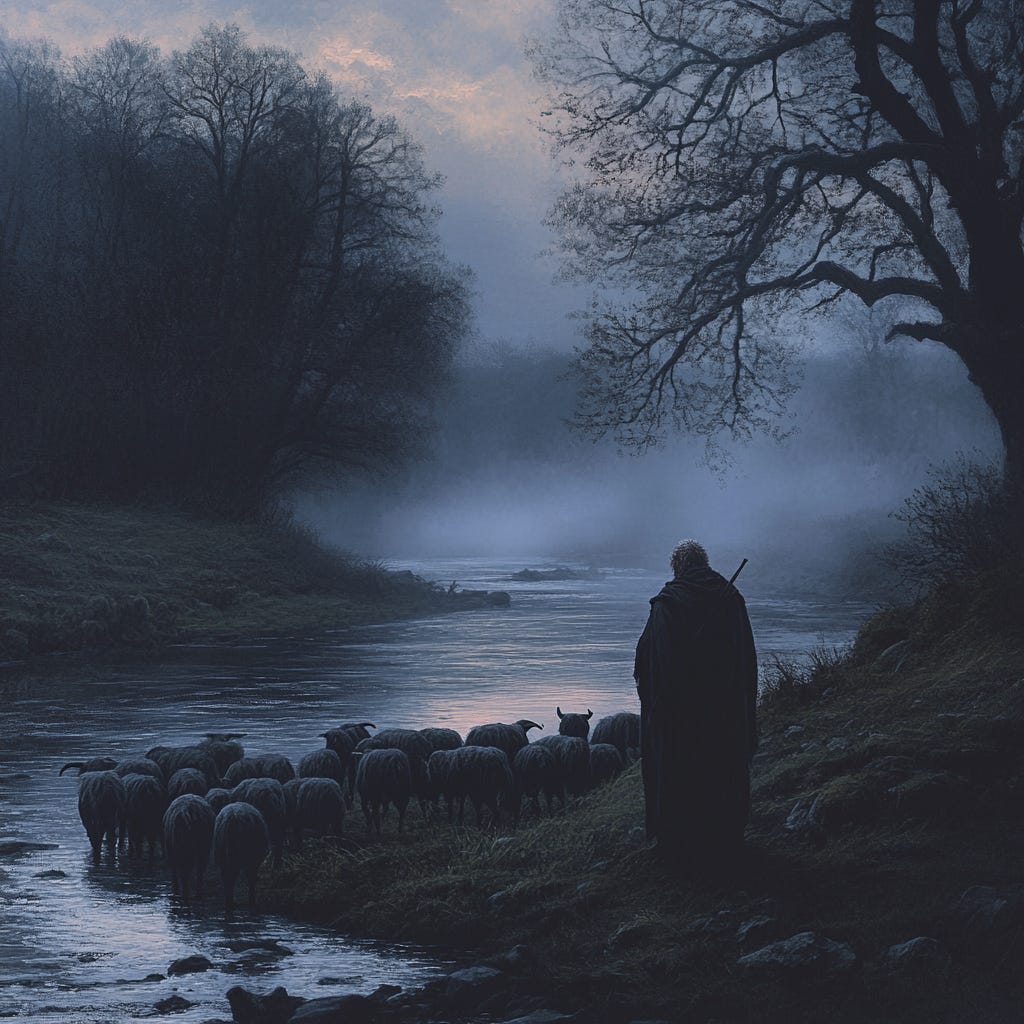“Der singende Knochen” (The Singing Bone) is the 28th tale in the 1812 edition of Kinder- und Hausmärchen (Children’s and Household Tales) by Jacob and Wilhelm Grimm. It is a morbid tale by twenty-first century standards but was not considered so at the time. However, it rarely appears in modern collections of the fairy tales of the Brothers Grimm geared toward children—although there are chipper cartoon retellings of it (set to music) available on YouTube.
The source of the tale was said to have been Henriette Dorothea Dortchen Wild (“Dortchen”), who married Wilhelm Grimm in 1825. The following reimagining is, on the whole, faithful to the original—to include a bit of Christian thumb-wagging in the middle to reinforce the moral—but I have expanded on the pivotal poem round which the narrative revolves and embellished a few scenes of this very brief tale.
The Singing Bone
Once upon a time, in a land far away, a wild boar laid waste the fields, slaughtered the cattle, and gored the poor farmers to death. The king said he would handsomely reward whoever slew the monster and brought its carcass to him. But that was easier said than done. For even the boldest trembled when approaching the enchanted forest in which the creature lived.
So the king issued a proclamation, stating that, if gold was not enticement enough, he would marry off his only daughter to whomsoever accomplished the feat. There were two peasant brothers who accepted the challenge. The elder was quick-witted and cunning, while the younger was innocent and went along with whatever the older told him to do.
They went to the castle and the king advised them to split up, saying, “If you both enter the forest from one side, the boar will go to the other and hide.” The brothers discussed the matter; and the older said he would enter from the west, because a pub he frequented was in that vicinity. He ordered the younger to enter from the east. So they broke up and went separate ways.
The young man entered the forest, climbing over the scrubby hills and going down into the verdant gullies. At sunset approached, he encountered a dwarf holding a black spear. The dwarf said he knew the young man was pure of heart, so he gave him the spear, saying, “This is magic and the boar cannot harm you if you wield it. And you can use it to kill the monster.”
The young man thanked the dwarf. He rested the spear on his shoulder and continuing through the woods. It was nearly dark when he found the boar rooting in the mud near a fallen tree. He lowered the spear and the boar came barreling toward him at such velocity that the spear split its heart in two and it fell down dead at his feet.
The young man thrust the spearpoint in the soil and it became a tree to replace the one that had fallen. He picked up the boar’s carcass and slung it over his shoulders. Then he headed west out of the woods. It took him a full day to reach the pub, where he found his older brother standing outside, smoking a long-stem pipe in the twilight.
When the older sibling saw the dead boar he was jealous, but smiled to hide what he felt. “Come inside,” he said. “I’ll order wine. You can tell me how you killed the boar.” The younger brother left the trophy outside and entered the crowded pub, where he ate, drank, and told his brother everything.
After that, they left and walked all night on a path that skirted the forest. The older brother volunteered to carry the boar. At dawn, they came to a covered bridge. The younger walked ahead to ensure the planks were stable. When they were halfway across, his brother slew him with a single blow from behind.
He buried the body on the opposite bank, picked up the dead boar and departed. When he came to the castle, he pretended that it was he who killed the boar. And then he married the king’s daughter. When people asked what had happened to his brother, he said, “He was always naive and was probably eaten by the boar.”
But nothing is hidden from God. And it was only a matter of time before his wicked deed was found out.
A few years later, at dusk, a shepherd watered his flock by the river. When he glanced up at the bridge, he thought he saw a man standing in the middle of it. But when he looked again, there was no one there.
He found a bone fragment sticking out of the mud and thought it would make a good mouthpiece for his horn. He cleaned it, affixed it to the horn, and blew.
When he did this the bone sang:
Oh shepherd, oh shepherd, I think you should know you have blown on a murdered man’s bone. My dear brother slew me a few years ago. Now I sleep by the river alone. He left me to rot ’neath the gray muddy shore. He stole what (by right) was my own. He wed the king’s daughter; he took the slain boar. You have blown on a murdered man’s bone.
“This is a remarkable mouthpiece,” the shepherd said. “I must blow this horn in the presence of the king.”
When he went to the castle and blew it, the bone sang the song again. The king turned in bewilderment to his son-in-law, as his daughter withdrew from the audience chamber without so much as dignifying her husband’s broken entreaties with a glance.
The man confessed to his crime, and said that the song they heard was the same one that plagued his dreams each night.
He led the king’s henchman to the bridge and showed them where he had buried his brother. When the skeleton was disinterred, the killer was sewn up in a weighted sack of jute fibers and dropped from the bridge into the deep river.
A marble tomb was erected to receive the mortal remains of the good brother. But the shade of the bad one was said to haunt the covered bridge ever after that. And those who crossed it were warned that, “If you hear a boar squeal when you are midway across, you will never make it to the other side.”










Wow! My first thought after reading this was that it reminded me of a Scottish ballad called “The Two Sisters” which has a similar premise about a jealous sister’s murder being revealed by a bone instrument (in this case it was a harp strung with hair). Dark but also kind of romantic stuff. I wonder if the story has especially deep roots for it to appear in so many places? A band I love does a song based on it: https://m.youtube.com/watch?v=ZGqeoZE60pc
The ending is chilling. Just the kind of warning you'd get as a child.